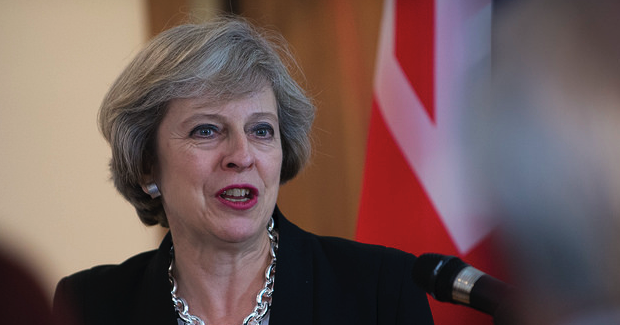A Hard Brexit for the UK

For three months, while the sun has mostly and unusually shone in what passes for summer in the United Kingdom, the British have come to believe that the Conservative government’s mantra “Brexit means Brexit” will not be so bad after all. Unemployment has remained more or less unchanged, economic growth has continued and the gloomy forecasts were unfulfilled. Until this week, that is, when several things happened.
The pound fell by 1.8 per cent, increasing the cost of fuel and food across the UK.
Prime Minister Theresa May announced she would trigger Article 50—giving notice of Britain’s intention to leave the European Union—before the end of March 2017. She further remarked that controlling immigration from the EU was a more important issue to the British people than remaining in the European single market. Other EU leaders have insisted that a free flow of people across EU borders was non-negotiable for Britain to keep single market status.
Even more significantly, May says the government will present a Great Repeal Bill to the House of Commons to replace the European Communities Act. This is the enabling legislation that gave force to all EU law since Britain signed up to what was then the European Communities in 1972. Contrary to reporting in the British tabloids, this does not do away with EU law, quite the opposite. All of it will become British law, unless repealed.
TheCityUK, a lobby group of the financial sector set up to fight for continued strong ties with the EU, said that under the government’s present policies £10 billion in tax revenues (A$16.7 billion) and 70,000 jobs would be lost through what has become known as a ‘hard Brexit’. The report estimates financial services generate between £190 billion and £205 billion of revenue annually and employ 1.1 million people.
In the north-east city of Sunderland, where 61 per cent voted for Brexit, the biggest employer, Nissan, suspended all new investment until it knows whether Britain will stay in the single market or not.
The London-based Commonwealth Secretariat published a report saying that Brexit would damage members‘ earnings from tourism. The report claims that remittances to Commonwealth citizens from relatives in Britain would fall in real terms, and that some countries in Africa, the Caribbean and the Indian subcontinent would experience a big hit from loss of exports.
Then, in the High Court, the Lord Chief Justice will this month hear several claims that Article 50 cannot be triggered without Parliamentary consent. It’s unlikely the High Court will challenge the right of the prime minister to trigger Article 50, not least because MPs will be able to scrutinise every section, every clause and every word of the European legislation. Who knows how many parliamentary sub-committees will have to be formed to spend their days and nights combing through the thousands of pages of legislation.
What next?
You can be sure that Opposition leader Jeremy Corbyn, re-elected by his party despite a move by his MPs to dump him, will have a field day, arguing the case for keeping much of it and pretty well everything in the social chapter. He will have the support of all but one of the MPs from the Scottish National Party. The House of Lords, where there is a very strong majority to stay in the EU, will do what it always does well – scrutinise and assess the impact of repeal.
In the Commons, the Tories will probably support May, but there are sufficient number of Conservative MPs uneasy about how Brexit negotiations will end to defy party whips and cross the floor.
In her rousing, emotional and often repetitive lines in her long final speech to her party conference on Wednesday, Mrs May repeated the trajectory of her remarks made outside Downing Street when taking office three months ago. But there was more. While she delighted many of her supporters—and, apparently, the right wing French presidential contender Marine Le Pen—with her aside to London elites who seek to distance themselves from the ordinary Briton remarking that “if you are a citizen of the world, you are a citizen of nowhere”.
The speech was unvarnished populist politics, and a major grab for the votes of the British working class that have traditionally supported Labour. She promised to build more public housing, make big improvements in schools, health and public infrastructure and strongly support the work of the public service. May promised to bear down on unfairness and irresponsible companies, and cut electricity bills. Individual and corporate tax avoiders and their accountants and financial advisers were in her sights: “It doesn’t matter to me who you are. If you’re a tax-dodger, we’re coming after you”. It was like Bill Shorten on steroids; in Birmingham the Tories clapped, some a little nervously.
May ended by remarking on the portraits of former British leaders she admired that hung in her office, including Benjamin Disraeli, Winston Churchill and Clement Atlee, the postwar Labour prime minister who created the National Health Service: “Those portraits remind me of the good government can do…those who stepped up to be counted when the big moment came…we face such a moment today.” She ended “Come with me, and together let’s seize the day.”
The British public will like her decision to put curbing immigration before the needs of the City of London financial community and the major exporters’ desire to continue selling into Europe: to ‘get back control’, the favoured mantra of the day. But she has declared war on the elites who feel the Brexit negotiations will not go well.
Gideon Rachman, the influential columnist of the Financial Times, believes Mrs May has fallen into a Brexit trap. He described her decision to trigger Article 50 as “reckless and driven by politics, rather than Britain’s national interest”.
The fact is Mrs May is winning the domestic politics, but losing the chance of getting a decent deal with Europe. Without that, much of her ambition will be unfundable. If financial markets shift to the continent, if car manufacturers close their principal market, if jobs start being lost, her rousing words will be just memories. The game is not over, but it is now on.
Colin Chapman is a writer, broadcaster and public speaker, who specialises in geopolitics, international economics and global media issues. He is the immediate past president of AIIA NSW.
This article is published under a Creative Common Licence and may be republished with attribution.





